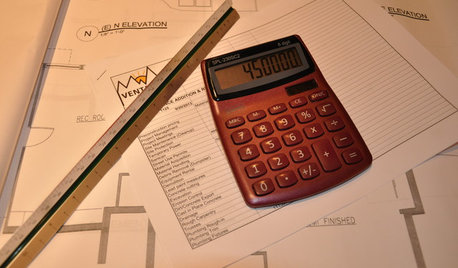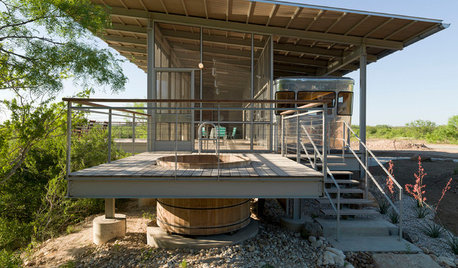New construction loan misrepresented (land as equity, etc)
Jeremia Froyland
5 years ago
last modified: 5 years ago
Featured Answer
Sort by:Oldest
Comments (64)
just_janni
5 years agoHello Kitty
5 years agolast modified: 5 years agoRelated Discussions
can I use my raw land as a down payment for a construction loan?
Comments (8)Building a custom home on land you own is different from buying or selling an existing home in many respects. For starters, the appraisal will be based on plans and specifications vs. tangible product. The market comparables used for the appraisal of your home may not be very comparable to what you intend to build. The appraisal process is highly regulated, and is pretty much dumbed down to no. of bedrooms, no. of baths and total finished living area. Don't look to inject any sanity into it. Many lenders in our (coastal VA) area use an 80% loan-to-value ratio which means they'll loan you up to 80% of the value of the total package (home and land.) So, if you own your lot and it represents 20% or more of the value of the home/lot package, you can finance all of the construction costs. Best wishes for a successful project....See MoreBuilding a home, questions about land as equity, down payment, etc.
Comments (33)It’s not the appraised value of each individual piece. It’s the appraised value of the project as a whole. It does not matter at all what the lot costs, or the constructions costs are. Costs are irrelevant to how much the bank could sell the house for if you defaulted. That is all anyone giving you a loan cares about: the value of the collateral. If you want to build a 1M house on a lot that you paid 1M for, but the surrounding area is trailer park central, and the lender thinks the whole project would sell for 500K, if you were lucky, then you are gonna need to bring 1.6M to the table to make it happen. Buying two lots only makes the end value worse. Larger lots do not appraise gor very much more over smaller lots....See MoreNew Construction Home: Pay Cash vs Construction Loan
Comments (4)Yes to your own RE attorney. Yes to a methodology of lien release tracking. Yes to setting up a construction draw schedule even if you don't have a loan. Your builder should know when he needs draws and design a schedule for you. Planning is everything. Know what you want and stick to it. Strangely enough, once the foundation is dug, a lot of risk diminishes. If there are no rocks or water, your foundation costs drop off. Shop around for other lenders. You only need a construction loan. Not a construction to perm. They are different. It's good to have a line of credit in your back pocket when building. I suggest you explore a home equity line of credit on your current home. If you need it, you have it. If you don't use it, you were prepared. Lenders will love you. They love to lend to people who don't need the money. And, they love lending to people who already own the land. Expect and prepare for cost overruns. Construction lending is high risk and you are lowest level of risk of a high risk endeavor. Make the lenders compete for your business....See MoreConstruction loan or HELOC to fund new construction?
Comments (7)It is very hard to get funding for construction. I am an architect, in a not popular company in Florida. I always wanted something more but it is hard to get up in this domain without experience. I am getting a lot of orders and I need to make the best project to approve my building. I spend nights in a row just to make the layout of the building. I try to make my layout impressive so I always to it very big and tall. Sometimes I can use Mi tower hire just to finish it. The size of the layout can impress the investors and choose your project to become real....See MoreJeremia Froyland
5 years agoHello Kitty
5 years agoJeffrey R. Grenz, General Contractor
5 years agoJeremia Froyland
5 years agoB Carey
5 years agobry911
5 years agolast modified: 5 years agoHello Kitty
5 years agobry911
5 years agoB Carey
5 years agoncrealestateguy
5 years agobry911
5 years agolast modified: 5 years agoJeffrey R. Grenz, General Contractor
5 years agoDenita
5 years agobry911
5 years agolast modified: 5 years agoLori
5 years agoJeffrey R. Grenz, General Contractor
5 years agoDenita
5 years agobry911
5 years agolast modified: 5 years agoJeremia Froyland
5 years agobry911
5 years agobry911
5 years agoB Carey
5 years agoJeffrey R. Grenz, General Contractor
5 years agoUser
5 years agolast modified: 5 years agoHello Kitty
5 years agoB Carey
5 years agolittlebug zone 5 Missouri
5 years agolast modified: 5 years agoHello Kitty
5 years agobry911
5 years agolast modified: 5 years agoHello Kitty
5 years agolast modified: 5 years agobry911
5 years agobry911
5 years agolast modified: 5 years agoJeffrey R. Grenz, General Contractor
5 years agoUser
5 years agoJeremia Froyland
5 years agoDenita
5 years agoB Carey
5 years agoHello Kitty
5 years agoJeffrey R. Grenz, General Contractor
5 years agolast modified: 5 years agoVirgil Carter Fine Art
5 years agoncrealestateguy
5 years agoJeffrey R. Grenz, General Contractor
5 years agoJeremia Froyland
5 years agoJeremia Froyland
5 years agoSam Goh
5 years agomillworkman
2 years agojust_janni
2 years agotete_a_tete
2 years ago
Related Stories

BUDGETING YOUR PROJECTDesign Workshop: Is a Phased Construction Project Right for You?
Breaking up your remodel or custom home project has benefits and disadvantages. See if it’s right for you
Full Story
REMODELING GUIDESConstruction Timelines: What to Know Before You Build
Learn the details of building schedules to lessen frustration, help your project go smoothly and prevent delays
Full Story
WORKING WITH PROSYour Guide to a Smooth-Running Construction Project
Find out how to save time, money and your sanity when building new or remodeling
Full Story
CONTRACTOR TIPSLearn the Lingo of Construction Project Costs
Estimates, bids, ballparks. Know the options and how they’re calculated to get the most accurate project price possible
Full Story
BUDGETING YOUR PROJECTConstruction Contracts: What to Know About Estimates vs. Bids
Understanding how contractors bill for services can help you keep costs down and your project on track
Full Story
REMODELING GUIDESWhat to Know About Budgeting for Your Home Remodel
Plan early and be realistic to pull off a home construction project smoothly
Full Story
MATERIALSHow Lumber Shortages Are Affecting Home Builds Globally
Houzz editors around the world report on how countries are adapting to an unprecedented shortage of construction wood
Full Story
LIFERetirement Reinvention: Boomers Plot Their Next Big Move
Choosing a place to settle in for the golden years? You're not alone. Where boomers are going and what it might look like
Full Story
CONTRACTOR TIPS10 Things to Discuss With Your Contractor Before Work Starts
Have a meeting a week before hammers and shovels fly to make sure everyone’s on the same page
Full Story





bry911